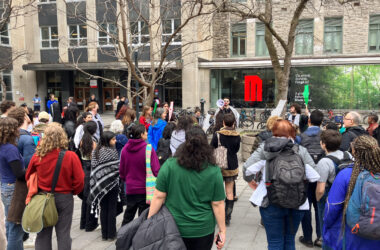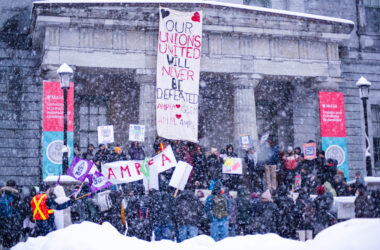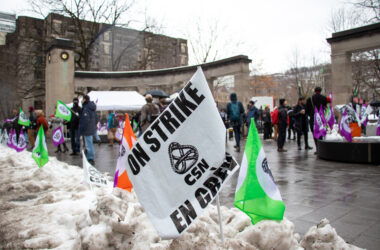 Matt Essert
Matt EssertThe Students’ Society Council voted to publicly censure President Zach Newburgh in the predawn hours of Friday morning for his role in pursuing a contract with Jobbook.com, a new social networking website designed to match students at elite universities with potential employers.
The deliberations and the vote to censure, which lasted nearly six hours in total, were held in confidential session, shrouding councillors’ exact reasoning for the decision in secrecy. In an interview shortly after the close of confidential session, however, Newburgh detailed his involvement with Jobbook, including his financial stake in the company and the trips to the U.S. and Britain he took on weekends since the Fall.
In mid-September, Newburgh said, Jean de Brabant, a McGill alumnus and former guest lecturer in the Faculty of Law, contacted him about an “incredible student service.” After repeated entreaties, Newburgh met with de Brabant, who told Newburgh about a project he was working on that was under patent. To discuss it, however, Newburgh would have to sign a confidentiality agreement. Thinking the proposal wouldn’t be a serious one, Newburgh signed.
“People ultimately make poor judgment calls,” he said. “This would be one of them.”
De Brabant told Newburgh about his idea for a web site that connected students to potential employers, which he envisioned being promoted by elite universities’ student unions. The initial plan, Newburgh said, was for him to call or email student leaders at other universities to recruit them. But later de Brabant decided that it would be more effective for them to make their pitch in person
As a full-time employee of SSMU, Newburgh told de Brabant that he would only be able to travel on weekends, when he could be away from the office. De Brabant understood, Newburgh said, but insisted Newburgh receive a financial stake in return.
“He was pretty adamant that if we were going to be doing this on the weekends and during my personal time that I also be afforded the opportunity to get some kind of cut,” he said.
Newburgh accepted this, he said, on the condition that SSMU get a cut as well. He negotiated a deal in which SSMU would receive one share of Jobbook for each student that signed up for the service. He refused, however, to disclose the details of his own stake in the company.
Over the next two months, Newburgh and de Brabant embarked on several trips to elite universities in the U.S. and Britain, paid for by de Brabant. In October, the pair drove through New England and the Mid-Atlantic, meeting with student union presidents at Harvard, the Massachusetts Institute of Technology, Yale, Princeton, Johns Hopkins, and the University of Pennsylvania. In November, they flew to California to visit five more universities, all of which signed contracts with the fledgling company.
Weeks later, the pair flew to Britain to pitch the idea to Oxford, Cambridge, University College London, and Imperial College.
Because he was bound the confidentiality agreement, Newburgh said, all three trips remained secret. In total, he said, he only missed one day of work at SSMU; for executives to take days off, though, he said, is “not at all uncommon.”
De Brabant’s confidentiality agreement ran out last month, Newburgh said, and he brought his four-month history with Jobbook to the attention of the Executive Committee on January 19. The matter came to a head on Wednesday—the same day that Jobbook officially launched. The meeting quickly devolved into a raucous shouting match between Vice-President University Affairs Joshua Abaki, who faulted Newburgh for his secrecy and what he called a conflict of interest, and VP Finance and Operations Nick Drew, who emphasized the website’s potential value to students.
“From my perspective, this is information you should have shared with all of the executive,” Abaki said at the meeting. “It doesn’t matter what you signed . . . the Society comes first.”
The Executive Committee voted to bring the matter to Council, where eight councillors—the minimum required number—voted in confidential session to impeach Newburgh. After concluding their regular business shortly after midnight, councillors debated for hours whether Newburgh deserved to be removed from office. They adjourned at about 5:15 a.m. after voting to censure him. Voting was by secret ballot, but the motion required the support of two-thirds of Council for approval.
Though Newburgh survived as president, the clash over Jobbook has left the executive deeply divided, with three members generally opposed to Newburgh and two others defending him. “How to move forward from here?” Newburgh said. “It is going to be tough.”
Newburgh remained upbeat about Jobbook, though, in which he recently renounced his financial stake. The website, he said, which generates revenue by charging a fee for companies who successfully use it to fill positions, “is going to explode.” That, he said, will make the controversy surrounding it worth it.
“Ultimately,” Newburgh added, “there was no harm done to the Society, there was no violation of any kind of policy, and this was always done in the best interests of students.”








